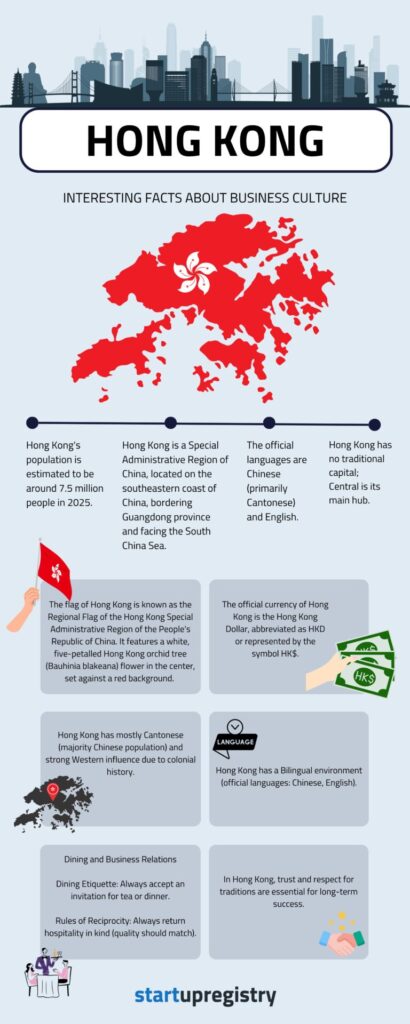Hong Kong Business Culture
A person who is about to move to a new place should know about the culture and all about that area.
Located along Western European and Asian cultural lines, Hong Kong makes up a highly developed urban landscape that embraces both bodies of people. Local people (Hongkongers) possess Westernized characteristics in addition to being highly skilled, motivated, and well-educated. Hong Kong consists primarily (98%) of Chinese citizens whose ancestry aligns with the Cantonese people, who also share the southeastern Chinese culture. According to Hong Kong’s cultural differences, the population believes in themselves as being separate from other Chinese people. Most customs and habits follow the Cantonese cultural pattern throughout Hong Kong. In this society, the family reputation, together with economic value, educational background, social status, and personal achievements, either brings respect or disrepute.
Hong Kong presents numerous aspects linked with China, although they exhibit notable contrasts throughout. Do not be fooled by the fact that Hong Kong shares a language with Guangdong and lies near the neighboring territory. People in Hong Kong maintained an affiliation with Chinese culture before 1997, when Chinese authorities ruled the city. A successful business operation in Hong Kong demands familiarity with the distinctive cultural characteristics of this specific area. This document provides users with information about Hong Kong’s business and cultural practices.
Understanding the Cultural Landscape in Hong Kong
Hong Kong boasts a vibrant and unique cultural identity, shaped significantly by its rich blend of Eastern traditions and Western influences. This dynamic fusion creates a distinctive social and business environment that is both deeply rooted in Chinese customs and open to global perspectives. Exploring these cultural nuances is essential for anyone looking to engage with the city, its people, or its dynamic marketplace.
1. Key Cultural Elements in Hong Kong
The majority of the population in Hong Kong is made up of local Cantonese, Chinese, and other Asian people. A large number of Chinese customs and habits, such as ‘saving face,’ ‘family honor,’ and ‘family solidarity,’ still prevail in the city. The local government recognizes Chinese and English as their official languages, while Cantonese, Chinese, and English are the primary spoken languages.
The Western and Eastern influences on cooking in Hong Kong resulted in the development of new fusion cuisine that dominates the local culinary scene. The biggest festival in Hong Kong is the Chinese New Year, together with the Mid-Autumn Festival and Ching Ming Festival, which bring gladness to its citizens. The business culture of Hong Kong exists through the powerful influences of Kung Fu, along with Tai Chi and Cantonese Opera.
2. Hong Kong Culture: One Country, Two Systems
Residents of Hong Kong need the “One Country Two Systems” idea to grow in their own uniqueness. Most of the people living here think they belong concurrently in China and Hong Kong. Through this framework, Hong Kong achieves judicial autonomy with a free press and democratic qualities without losing its connection to Mainland China. Business culture in Hong Kong exhibits distinct characteristics that distinguish it from what is seen in mainland China. Under capitalist leadership, Hong Kong operates as a free market economy, yet China maintains its state-influenced socialist economic model. The legal framework in the city is based on British common law. On the other hand, laws in Mainland China are influenced by socialist legal principles.
Mastering the Art of “Face”: Cultural Etiquette Hong Kong’s Unspoken Rules
Here are a few tips to remember when meeting someone for business in Hong Kong.
Greetings and Introductions in Hong Kong
It is polite to shake hands with all the people when meeting and leaving. When performing handshakes Chinese people apply minimal pressure than typical Westerners. The person with a higher seniority position gets their introduction before others. The traditional Chinese societal protocol positions elderly adults in superior positions to those of young people, with women occupying a rank above men.
Names and Titles
A Chinese name consists of two specific components. First is the family name, which ends with the personal name. Professional titles or the combination of the family name with the titles Mr./Mrs./Miss serve as proper identifiers for Chinese people.
Body Language
Body language plays a very important role. That is why maintaining a proper and healthy distance between guests. Gestures can also have negative and positive impacts. The use of an open hand indicates a person because index finger pointing is reserved only for animals. When calling someone, an individual should place their palm downward on the floor and move their fingers. Winking at a different person is seen as improper social behavior.
Dress Code
Hong Kong workers follow traditional business standards that require formal attire for work occasions. Professionals in Hong Kong pair formal ties and shirts with dark or muted colored suits. Hong Kong residents use these as their preferred ways of behavior. In this culture, people prioritize the selection of colors for their business attire. Professionals in the workforce wear red clothing to bring luck, but white clothes signal mourning significance among society members. A fashionable necklace combined with a classy watch serves as an excellent choice for outfit accessories.

From Handshakes to Deals: Navigating Hong Kong Business Meetings with Finesse
Business individuals normally schedule their upcoming meetings in advance. This is at least one month before the intended meeting date. Use telephone communication at least one day before the scheduled appointment to confirm the person’s attendance. Your timekeeping competence determines the quality of your involvement in Hong Kong business meetings. People who perform their duties on time receive recognition in Hong Kong society.
Negotiation Strategies
Successful negotiation results require patience, diplomacy, and compromise procedures between the parties. Indirect communication is a huge part of the business culture. ‘Yes’ doesn’t mean the deal is locked, and “This may be very difficult” or “I will have to wait” are the terms that you might hear in place of ‘No.’ If someone hands you their business card, avoid writing anything on it in front of them. Also, it is respectful to look at the card in front of the person.
Building Relationships in Hong Kong
Strong business relationships within Hong Kong, along with business expansion, have achieved their best results via direct face-to-face meetings. A business procedure involving contracts requires lawyers only after both parties finalise their formal agreement through signatures.
The Language of Connection: Building Hong Kong Business Relationships Through Dining and Entertainment
Invitations and Seating
If your business contact invites you for lunch or dinner, then avoid refusing it. Rather, give another date if you are not going to make the date. Also, keep attention to where you are sitting. If you don’t know where to sit, then politely ask the host about the seating arrangement.
Dining Customs
Tea is a traditional beverage for any occasion in Chinese culture. It will be filled continually until you leave the cup filled. If the host toasts you as a guest of honor, then you should smile, raise your glass, drink, and thank everyone. The server attends to get the play filled each time you finish a dish. So, if you are finished eating, leave a portion of the dish on the plate.
Reciprocity
You must respond with an equal-level hospitality event toward any business contact after you accept their invitation to dine with them. A response of equivalent meal quality is demanded when you accept hospitality in Hong Kong. The hotel staff can handle preparations and ensure top-notch guest services upon your request.
The Subtle Art of Giving in Hong Kong Business Culture
During both Christmas and Chinese New Year, people of Hong Kong customarily present gifts to their family members. For Hong Kong people, Number 4-related gifts are the preferred choice; however, pointed tools need to be strictly excluded from gift selection. Hong Kong people must stay away from both black and blue mourning colors, as well as escape white appearances.
Presentation and Reciprocation
The complete gift needs to be wrapped during transport before you present it with both hands to your host. Using both hands shows respect. Upon receiving gifts from others, one should provide equivalent valuable presents in return. A suitable gift falls between a lavish one and a frivolously cheap gift.
Insider Tips for Seamless Integration into Hong Kong Business Culture
- Follow up with the host to deal with the etiquette nicely.
- If you breathe in air through your teeth, it is a sign of dismay. So avoid doing it.
- Accept tea or drinks if they are offered to you.
- It is bad to blow your nose during a business meeting, so avoid it.
- Leave for an appointment with ample travel time, as punctuality is important.
Your Bridge to Success: Embracing Hong Kong Business Culture for Lasting Partnerships
Understanding the culture is key to building relationships in Hong Kong. If you understand the people, their traditions, language, and cultural etiquette in Hong Kong, you can easily connect with them. That is why it is important to invest some time in learning about Chinese traditions, festivals, cuisines, and body language. Building strong relationships is of great value in Hong Kong.
If you build a strong partnership, then you can have a better idea of market trends, competitors, and opportunities. Entrepreneurs should approach business interactions with respect and cultural sensitivity. This prevents you from hurting cultural sentiments and creates a positive image. If you are looking for entrepreneurial services, then Startupr is here to assist you in doing Business in Hong Kong. It offers business incorporation, mail forwarding, business address, accounting and bookkeeping, and various other services that can help you operate a business efficiently.
Last update: June 2025


